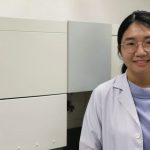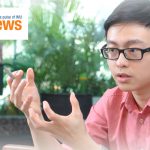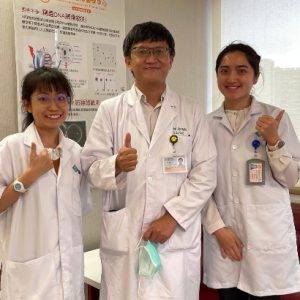IMU University hosted an enlightening seminar on 3 July 2024 that delved into the intricate relationship between gut microbiome and reproductive health. The seminar, chaired by A/ Prof Dr Chye Soi Moi from the University’s Applied Biomedical Science and Biotechnology (ABSB) Division, featured esteemed speakers from Academia Sinica and National Tsing Hua University, Taiwan, who shared their cutting-edge research and insights with students and staff alike. The event attracted around 65 participants, underscoring the high level of interest in this critical area of study.
The seminar commenced with a presentation by Dr Chiang Yin-Ru, Deputy Director of the Biodiversity Research Centre at Academia Sinica.
Dr Chiang Yin-Ru, Deputy Director of the Biodiversity Research Centre at Academia Sinica
His talk, titled “Clostridium innocuum, an Opportunistic Gut Pathogen, Inactivates Host Gut Progesterone and Arrests Ovarian Follicular Development,” provided a deep dive into how specific gut pathogens can disrupt essential hormonal balances necessary for ovarian function. Dr Chiang’s research opened new avenues for understanding and potentially treating such disruptions.
Assistant Professor Dr Hsiao Tsun-Hsien
Assistant Professor Dr Hsiao Tsun-Hsien presented his innovative research titled “A Novel Strategy: The Application of Androgen-Metabolising Gut Bacteria in Alleviating Hyperandrogenism.” Dr Hsiao’s work highlighted the potential of utilising gut bacteria to address hormonal imbalances associated with hyperandrogenism, suggesting promising new therapeutic approaches.
Final presentation was delivered by postdoctoral fellow Dr Brandon-Mong Guo-Jie, a distinguished alumnus of IMU University from the Biomedical Science BM111 cohort.
His lecture, “Multi-Omic Insights into the Role of Gut Bacteria on The Sexual Development of Anguilla bicolor,” explored the complex biological interactions between gut microbiota and sexual development in aquatic organisms, using advanced multi-omic techniques to unravel these relationships.
After the talks, attendees had the opportunity to engage with the speakers during a refreshments and networking session. This informal gathering allowed students and staff to connect directly with the researchers, discuss the presented studies, and explore further questions in a more relaxed environment. Such interactions are invaluable for students, providing inspiration and insight into potential career paths and research interests.
Following this, the three speakers met with IMU staff from the ABSB Division to discuss current research interests. This meeting facilitated a rich exchange of ideas and laid the groundwork for future collaborations. The discussions highlighted the strengths of IMU University’s commitment to advancing research and fostering innovation.

For students, the seminar provided exposure to pioneering research, enhancing their critical thinking and analytical skills.

The interaction with accomplished researchers and alumni like Dr Brandon also offered networking opportunities and inspiration to pursue their own research aspirations. For faculty, the seminar provided professional development, insights into the latest research trends, and opportunities for collaborative projects, all of which contribute to a vibrant and dynamic academic environment.
The event culminated in a collaborative discussion between IMU staff and the speakers, focusing on potential areas for joint research. This dialogue underscored the importance of interdisciplinary collaboration and the sharing of expertise to tackle complex biomedical challenges. The seminar thus served as a catalyst for future partnerships, promoting a culture of continuous learning and professional development within the academic community.
In conclusion, the Academia Sinica Seminar at IMU University not only highlighted groundbreaking research in gut microbiome and reproductive health but also fostered a spirit of collaboration and innovation. It demonstrated the university’s commitment to providing a holistic and forward-thinking educational experience.
Written by Ong Jing Rou, Year 1 Biomedical Science Student from BM123, School of Health Sciences
Edited by A/Prof Dr Lim Chooi Ling




 Dr Chiang Yin-Ru, Deputy Director of the Biodiversity Research Centre at Academia Sinica (on the right) receiving a token of appreciation.
Dr Chiang Yin-Ru, Deputy Director of the Biodiversity Research Centre at Academia Sinica (on the right) receiving a token of appreciation. 



